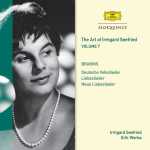
Composer: Werner Egk, Hugo Wolf
Performer: Irmgard Seefried, Erik Werba
Orchestra: Symphonieorchester des Bayerischen Rundfunks
Conductor: Werner Egk
Format: FLAC (tracks)
Label: Deutsche Grammophon
Catalogue: ELQ4807236
Release: 2014
Size: 330 MB
Recovery: +3%
Scan: cover
Wolf: Spanisches Liederbuch
01. Wunden trägst du, mein Geliebter
02. Die ihr schwebet um diese Palmen
03. Ach, des Knaben augen
04. Mühvoll komm’ ich und beladen
05. Herr, was trägt der Boden hier
06. Bedeckt mich mit Blumen
07. In dem Schatten meiner Locken
08. Geh’ Geliebter
09. Sie blasen zum Abmarsch
10. Sagt, seid ihr es, feiner Herr
11. Mögen alle bösen Zungen
Wolf: Mörike-Lieder
12. 12. “Verborgenheit”
13. 3. Ein Stündlein wohl vor Tag
14. No. 9 Nimmersatte Liebe
15. 14. In der Frühe
16. 14. Agnes
17. 35. Frage und Antwort
18. 7. Das verlassene Mägdlein
19. 28. Gebet
20. 11. An eine Äolsharfe
21. 39. Denk’ es, O Seele!
22. 23. Auf ein altes Bild
23. 13. “Im Frühling”
Egk: Quattro Canzoni
24. 1. Canto delle risaie
25. 2. Tu nel tuo letto
26. 3. Crudele Irene
27. 4. Tarantella
Like so many artists from north of the Alps, Wolf was lured by the Mediterranean south, an intoxicating world of light, sensual grace and intense, often violent emotions. His Spanisches Liederbuch of 1889–90, 34 settings of Iberian folk poems translated by Emanuel Geibel and Paul Heyse, is the finest fruit of a long-lasting fascination with Spain. In the sacred settings, Seefried brings her characteristic intensity as well as a guileless radiance. In the secular settings we get to experience the coquettish and mischievous side of the singer. From the same year (1959) we have a selection of Wolf’s Mörike settings.
As a rare pendant, Seefried performs Werner Egk’s Quattro canzoni, composed in 1932, after an Italian sojourn, and revised in 1955. In their florid virtuosity – uninhibitedly relished by Seefried – and popular dance rhythms, these four songs are a German’s tribute to Goethe’s ‘land when the lemon trees bloom’.
As for the entire series comprising eleven volumes, Richard Wigmore provides the insightful notes.



